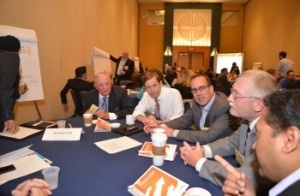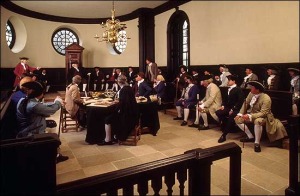This week I attended the 2014 Executive Leadership Conference hosted by ACT-IAC in Williamsburg, VA. While it was a familiar venue for the annual conference, and in some ways the topics of discussion were familiar as well – maybe too familiar, more on that later – the format was quite different from years past. This year, the event adopted a much more interactive  approach to engaging the participants. Rather than the usual government-industry conferences featuring panels of talking heads pontificating to the mostly disengaged audience, ELC essentially put everyone there on the panel with the people leading the discussions simply acting as provocateurs. The idea was to leverage human centered design to bring diverse perspectives together to solve problems. As an admitted introvert, heading into it, I was a bit apprehensive. However, it turned out to be a fantastic experience.
approach to engaging the participants. Rather than the usual government-industry conferences featuring panels of talking heads pontificating to the mostly disengaged audience, ELC essentially put everyone there on the panel with the people leading the discussions simply acting as provocateurs. The idea was to leverage human centered design to bring diverse perspectives together to solve problems. As an admitted introvert, heading into it, I was a bit apprehensive. However, it turned out to be a fantastic experience.
The tone was set nicely on Sunday evening by Frans Johansson, author of The Medici Effect, a book that discusses practical application of human centered design or design thinking. Workshops, classes, and whiteboard-focused discussion groups on Monday advanced the dialog around a number of topics facing government and industry including shared services, citizen-centric government, the rise of millennials in the federal work force, challenges with the federal procurement process, and barriers to innovation in government.
 One of the best sessions was actually at the end of the conference – the CxO roundtable in which groups of industry folks sat with two to three C-level government leaders to talk about and brainstorm around the topics mentioned above. It led to some of the most insightful (but off-the-record – sorry!) dialog of the entire event. As someone on the industry side, I gained new appreciation for some of the big rocks – particularly legislative, regulatory, and policy rocks – that are preventing the government from taking what would otherwise be logical steps to address some of their challenges. On the flip side, I’d like to think that my government counterparts left the table with a better understanding of why industry sometimes misses the mark in what we try to do to help the government meet its missions and what they might do to help change that.
One of the best sessions was actually at the end of the conference – the CxO roundtable in which groups of industry folks sat with two to three C-level government leaders to talk about and brainstorm around the topics mentioned above. It led to some of the most insightful (but off-the-record – sorry!) dialog of the entire event. As someone on the industry side, I gained new appreciation for some of the big rocks – particularly legislative, regulatory, and policy rocks – that are preventing the government from taking what would otherwise be logical steps to address some of their challenges. On the flip side, I’d like to think that my government counterparts left the table with a better understanding of why industry sometimes misses the mark in what we try to do to help the government meet its missions and what they might do to help change that.
ACT-IAC has been doing a great job of not just fostering these kinds of discussions at their major events, but maintaining the momentum of those discussions from one event to the next as well as by advancing the topics in more detail through the efforts of the many Shared Interest Groups (SIG) within ACT-IAC. AEGIS co-chairs the IV&V Committee within the Collaboration & Transformation SIG. The goal of that committee is to help identify, document, and provide outreach around best practices in the areas of independent verification and validation, quality assurance, and testing. While ELC is geared toward government and industry executives, the SIGs are a place where anyone and everyone can contribute to these sames kinds of discussions and projects.
Would you like to make a difference? Check out ACT-IAC and consider volunteering your time with one of the SIGs! More information can be found here.
 One unfortunate aspect of ELC is that despite being geographically in a place so significant to the history of the nation, we didn’t really get to appreciate that. We spent too much of our time inside the conference center to really take in the full ambiance of Williamsburg. And that’s too bad. Because if we had, we might have realized that we’re trying to create modern solutions to problems that would have, at a fundamental level, probably seemed familiar to the colonists: procurement rules impacting commerce in a bad way, difficulty bringing innovation given the imposition of too many rules, challenges related to a shifting culture, and generally the idea that government really should be by the people, of the people, and for the people. Have we really been trying to solve these same kinds of problems for 400 years? Maybe not exactly. Fortunately, thanks to effective forums like ELC and the excellent work of organizations like ACT-IAC, it’s not going to take a revolution to deal with the problems this time. But it will take diverse perspectives and positive dialog, and to that end I look forward to the ACT-IAC events to come.
One unfortunate aspect of ELC is that despite being geographically in a place so significant to the history of the nation, we didn’t really get to appreciate that. We spent too much of our time inside the conference center to really take in the full ambiance of Williamsburg. And that’s too bad. Because if we had, we might have realized that we’re trying to create modern solutions to problems that would have, at a fundamental level, probably seemed familiar to the colonists: procurement rules impacting commerce in a bad way, difficulty bringing innovation given the imposition of too many rules, challenges related to a shifting culture, and generally the idea that government really should be by the people, of the people, and for the people. Have we really been trying to solve these same kinds of problems for 400 years? Maybe not exactly. Fortunately, thanks to effective forums like ELC and the excellent work of organizations like ACT-IAC, it’s not going to take a revolution to deal with the problems this time. But it will take diverse perspectives and positive dialog, and to that end I look forward to the ACT-IAC events to come.

